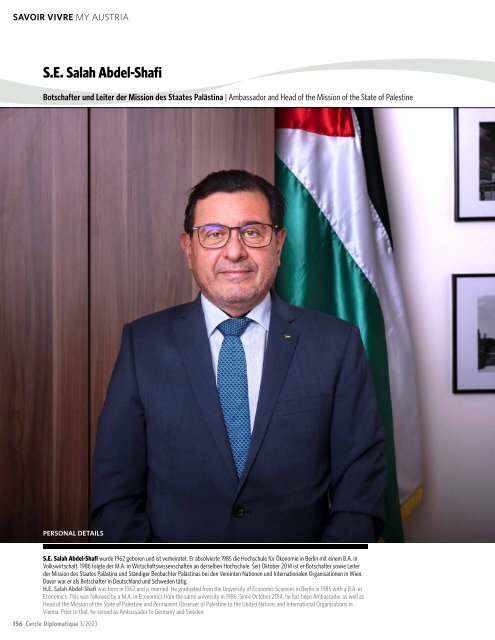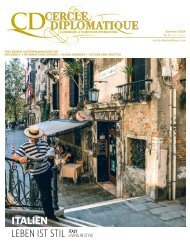CERCLE DIPLOMATIQUE - issue 03/2023
CD is an independent and impartial magazine and is the medium of communication between foreign representatives of international and UN-organisations based in Vienna and the Austrian political classes, business, culture and tourism. CD features up-to-date information about and for the diplomatic corps, international organisations, society, politics, business, tourism, fashion and culture. Furthermore CD introduces the new ambassadors in Austria and informs about designations, awards and top-events. Interviews with leading personalities, country reports from all over the world and the presentation of Austria as a host country complement the wide range oft he magazine.
CD is an independent and impartial magazine and is the medium of communication between foreign representatives of international and UN-organisations based in Vienna and the Austrian political classes, business, culture and tourism. CD features up-to-date information about and for the diplomatic corps, international organisations, society, politics, business, tourism, fashion and culture. Furthermore CD introduces the new ambassadors in Austria and informs about designations, awards and top-events. Interviews with leading personalities, country reports from all over the world and the presentation of Austria as a host country complement the wide range oft he magazine.
You also want an ePaper? Increase the reach of your titles
YUMPU automatically turns print PDFs into web optimized ePapers that Google loves.
SAVOIR VIVRE MY AUSTRIA<br />
S.E. Salah Abdel-Shafi<br />
Botschafter und Leiter der Mission des Staates Palästina | Ambassador and Head of the Mission of the State of Palestine<br />
Interview: Daniela Pötzl Photos: Ralph Manfreda<br />
PERSONAL DETAILS<br />
S.E. Salah Abdel-Shafi wurde 1962 geboren und ist verheiratet. Er absolvierte 1985 die Hochschule für Ökonomie in Berlin mit einem B.A. in<br />
Volkswirtschaft. 1986 folgte der M.A. in Wirtschaftswissenschaften an derselben Hochschule. Seit Oktober 2014 ist er Botschafter sowie Leiter<br />
der Mission des Staates Palästina und Ständiger Beobachter Palästinas bei den Vereinten Nationen und Internationalen Organisationen in Wien.<br />
Davor war er als Botschafter in Deutschland und Schweden tätig.<br />
H.E. Salah Abdel-Shafi was born in 1962 and is married. He graduated from the University of Economic Sciences in Berlin in 1985 with a B.A. in<br />
Economics. This was followed by a M.A. in Economics from the same university in 1986. Since October 2014, he has been Ambassador as well as<br />
Head of the Mission of the State of Palestine and Permanent Observer of Palestine to the United Nations and International Organisations in<br />
Vienna. Prior to that, he served as Ambassador to Germany and Sweden.<br />
Welche Bezirke Wiens gefallen Ihnen am besten und welche<br />
Bundesländer haben Sie bereits besucht?<br />
Wien ist sehr unterschiedlich. Man kann es klassisch haben, wie im<br />
ersten Bezirk, den ich sehr mag. Auch den alten Kern von Wien<br />
schätze ich besonders. Aber die Stadt hat auch viel an Natur zu<br />
bieten, wie z. B. die Donauinsel oder den Kahlenberg. Und man kann<br />
öffentlich hinfahren. In dieser Stadt sind die öffentlichen Verkehrsmittel<br />
unglaublich effizient. Wenn man es mehr multikulti haben möchte,<br />
besucht man Favoriten. Ich gehe auch oft an der Donau spazieren.<br />
Kulinarisch hat die Stadt viel zu bieten, sie ist vielfältig und das macht<br />
sie interessant. Das Angebot an Kultur ist groß und an klassischer<br />
Musik zudem sehr charmant. Und ich besuche gerne die Kaffeehäuser.<br />
Was die Bundesländer betrifft, habe ich außer Vorarlberg alle<br />
besucht.<br />
Sie haben Ihren Posten in Österreich 2013 angetreten. Aus<br />
Ihrer persönlichen Sicht – hat sich Wien Ihrer Meinung nach in<br />
den vergangenen 10 Jahren verändert?<br />
Wenn man ständig in einer Stadt ist, merkt man die Veränderungen<br />
nicht so sehr. Bevor ich als Botschafter hierherkam, war ich 1996 das<br />
letzte Mal in Wien. Damals wirkte die Innenstadt auf mich wie ein<br />
großes Dorf mit Aufbruchstimmung, nach dem Wegfall des Eisernen<br />
Vorhangs. Dann kam ich 2013 wieder, davor war ich Botschafter in<br />
Berlin. Zurzeit habe ich das Gefühl, dass Wien ein bisschen liberaler,<br />
jünger, multikultureller und offener wird.<br />
Wie sind die bilateralen Beziehungen zwischen unseren<br />
beiden Ländern?<br />
Österreich war das erste westliche Land, das Beziehungen zu<br />
Palästina geknüpft hat. Bruno Kreisky war der erste westliche<br />
Politiker, der Jassir Arafat 1979 in Österreich empfangen hat.<br />
Demzufolge ist diese Mission die erste palästinensische Vertretung in<br />
Westeuropa. Bruno Kreisky hat die Tore von Westeuropa für uns<br />
geöffnet. Dann hat er Willy Brandt und Olaf Palme geholt. Die<br />
Beziehungen haben sich ständig entwickelt – politisch, aber auch was<br />
Entwicklungshilfe anbelangt.<br />
Inwiefern ist z. B. die Austrian Development Agency (ADA)<br />
für Ihr Land hilfreich?<br />
Österreich ist bei der Entwicklungshilfe geblieben. Das einzige Büro<br />
der ADA im Nahen Osten ist in Palästina in Ramallah. Dort werden<br />
sogar zusätzliche Mitarbeiter eingestellt. Als der Friedensprozess<br />
damals Anfang der 1990er-Jahre angefangen hat, haben Österreich<br />
wie auch andere Länder der EU, ihre Hilfe intensiviert.<br />
Ich komme aus dem Gazastreifen, dort haben wir ein Wohnungsbauprogramm,<br />
das von Österreich finanziert wurde und daher gibt es<br />
auch das sogenannte „Österreichische Wohnviertel“. Politisch gibt es<br />
manchmal Meinungsunterschiede, was die Haltung der österreichischen<br />
Bundesregierung gegenüber dem israelisch-palästinensischen<br />
Konflikt betrifft. Der Dialog zwischen Österreich und Palästina ist<br />
jedoch vorhanden wie auch die Beziehungen und wir reden offen<br />
miteinander. Österreichs Außenminister Schallenberg besuchte im<br />
Vorjahr die Palästinensergebiete. Wie ich Neutralität verstehe, ist es<br />
das Festhalten am Völkerrecht.<br />
Which districts of Vienna do you like best and which provinces<br />
have you already visited?<br />
Vienna is very different. You can have it classical, like in the first<br />
district, which I like very much. I also particularly appreciate the old<br />
core of Vienna. But the city also has a lot to offer in terms of nature,<br />
like the Danube Island or the Kahlenberg. And you can go there by<br />
public transport. In this city, public transport is incredibly efficient.<br />
If you want it to be more multicultural, visit Favoriten. I also often go<br />
for walks along the Danube. Culinary-wise, the city has a lot to offer,<br />
it‘s diverse and that makes it interesting. There is a lot of culture on<br />
offer, and classical music is also very charming. And I like to visit the<br />
coffee houses. As for the provinces, I have visited all of them except<br />
Vorarlberg.<br />
You took up your post in Austria in 2013. From your personal<br />
perspective – do you think Vienna has changed in the past 10<br />
years?<br />
When you are in a city all the time, you don‘t notice the changes so<br />
much. Before I came here as an ambassador, the last time I was in<br />
Vienna was in 1996. At that time, the city centre seemed to me like a<br />
big village with a spirit of optimism after the fall of the Iron Curtain.<br />
Then I came back in 2013, before that I was ambassador in Berlin. At<br />
the moment I have the feeling that Vienna is becoming a bit more<br />
liberal, younger, more multicultural and more open.<br />
What are the bilateral relations between our two countries?<br />
Austria was the first Western country to establish relations with<br />
Palestine. Bruno Kreisky was the first Western politician to receive<br />
Yasser Arafat in Austria in 1979. Consequently, this mission is the first<br />
Palestinian representation in Western Europe. Bruno Kreisky opened<br />
the gates of Western Europe for us. Then he brought in Willy Brandt<br />
and Olaf Palme. Relations have developed steadily – politically, but<br />
also in terms of development aid.<br />
To what extent is the Austrian Development Agency (ADA)<br />
helpful for your country, for example?<br />
Austria has stuck to development aid. The only ADA office in the<br />
Middle East is located in Palestine in Ramallah. Additional staff are<br />
even being hired there. When the peace process started in the early<br />
1990s, Austria, like other EU countries, intensified their aid.<br />
I come from the Gaza Strip, we have a housing programme there that<br />
was financed by Austria and that is why there is also the so-called<br />
“Austrian housing distric“. Politically, there are sometimes differences<br />
of opinion regarding the attitude of the Austrian Federal Government<br />
towards the Israeli-Palestinian conflict. However, the dialogue<br />
between Austria and Palestine exists, as do the relations, and we talk<br />
openly with each other. Austria‘s Foreign Minister Schallenberg<br />
visited the Palestinian territories last year. As I understand<br />
neutrality, it is adherence to international law.<br />
Von oben nach unten:<br />
Portraits von Jassir Arafat,<br />
Mitbegründer und Vorsitzender der<br />
Palästinensischen Befreiungsorganisation<br />
(links) und Mahmud Abbas,<br />
Präsident des Staates Palästina<br />
(rechts). Im Gespräch mit CD.<br />
Erinnerungsfotos an ein Treffen mit<br />
Papst Benedikt VI. (links) und bei<br />
der Angelobung in der Hofburg<br />
durch den damaligen Bundespräsidenten<br />
Österreichs, Heinz Fischer.<br />
Darunter: Persönliche Erinnerungsstücke.<br />
From top to bottom:<br />
Portraits of Yasser Arafat, co-founder<br />
and Chairman of the Palestine<br />
Liberation Organisation (left) and<br />
Mahmoud Abbas, President of the<br />
State of Palestine (right).<br />
In conversation with CD.<br />
Souvenir photos of a meeting with<br />
Pope Benedict VI (left) and at the<br />
inauguration at the Hofburg by then<br />
Austrian Federal President Heinz<br />
Fischer.<br />
Below: Personal mementos.<br />
156 Cercle Diplomatique 3/<strong>2023</strong><br />
Cercle Diplomatique 3/<strong>2023</strong> 157
















